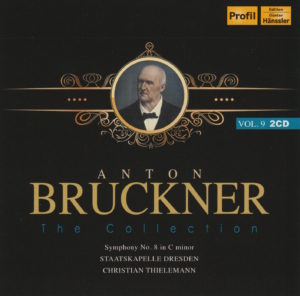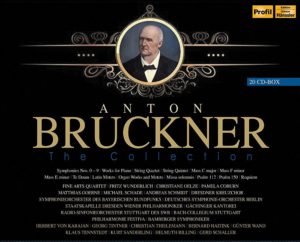 This morning’s conductor of Anton Bruckner’s Symphony No. 8 in C Minor (WAB 108) (nicknamed “The Apocalyptic,” although I don’t know why) is German-born Christian Thielemann (1959-). The orchestra is the Staatskapelle Dresden.
This morning’s conductor of Anton Bruckner’s Symphony No. 8 in C Minor (WAB 108) (nicknamed “The Apocalyptic,” although I don’t know why) is German-born Christian Thielemann (1959-). The orchestra is the Staatskapelle Dresden.
I had never heard of Christian Thielemann before this morning.
And, if you’re astute, you’ll notice the “T” of Thielemann doesn’t alphabetically follow the “C” of Chailly.
That’s because the “T” of Thielemann is part of the “C” of the Bruckner Collection – and the “Co” of “Collection” follows the “Ch” of “Chailly.” It just so happens that the Bruckner Collection includes all sorts of conductors, some of whom have been very, very good.
This 20-CD box set would be quite nice, indeed, if it offered one thing.
What that one thing is, I’ll mention later.
Oh, okay. You dragged it out of me. I’ll mention it now: liner notes.
A booklet. Something with words on it that tells me about the conductors, Bruckner, his symphonies, the orchestras, etc. I hate box sets without liner notes. Especially this one because the performances and conducting has been surprisingly good.
Because this is the first time I encounter a person, I like to do a little digging.
Here’s what I learned about Mr. Thielemann, from his entry on Wikipedia:
Christian Thielemann (born 1 April 1959 in Berlin) is a German conductor. He is Chief Conductor of the Staatskapelle Dresden and the Director of the Salzburg Easter Festival.
Thielemann studied viola and piano at the Hochschule für Musik in Berlin and took private lessons in composition and conducting before becoming répétiteur aged 19 at the Deutsche Oper Berlin with Heinrich Hollreiser and working as Herbert von Karajan’s assistant. He worked at a number of smaller German theatres including the Musiktheater im Revier in Gelsenkirchen, in Karlsruhe, Hanover, at Düsseldorf’s Deutsche Oper am Rhein as First Kapellmeister and in Nürnberg as Generalmusikdirektor before returning to the Deutsche Oper Berlin in 1991 to conduct Wagner’s Lohengrin. During this time he also assisted Daniel Barenboim at the Bayreuth Festspielhaus.
Controversy has attended to Thielemann after attribution of anti-semitic remarks to him in 2000, regarding Daniel Barenboim, which Thielemann subsequently denied. Other controversy has related to Thielemann’s publication of opinions in sympathy to the Pegida movement.
In 2003, Thielemann was awarded the Order of Merit of the Federal Republic of Germany (Bundesverdienstkreuz). In October 2011, he received honorary membership of the Royal Academy of Music in London. In 2015, Thielemann won the Richard Wagner Award (Richard-Wagner-Preis) of Leipzig. He served as the Humanitas Visiting Professor in Opera Studies at Oxford University in January 2016.
Hmm. He assisted both Karajan and Barenboim. That’s quite a resume.
Here’s more about Maestro Thielemann from the Staatskapelle Dresden web site.
And then there’s this from the The Telegraph (UK), which calls him “Germany’s most sought-after conductor,” and begins with:
The über-conductor discusses his first Salzburg Easter Festival, rivalry with Daniel Barenboim, and rumours of taking over the Berlin Philharmonic from Simon Rattle.
Curioser and curioser.
Previously, in The Bruckner Collection, I listened to performances from:
Gerd Schaller, Day 3, Symphony No. 1
Gerd Schaller, Day 19, Symphony No. 2
Klaus Tennstedt, Day 35, Symphony No. 3
Kurt Sanderling, Day 51, Symphony No. 4
Gunter Wand, Day 67, Symphony No. 5
Bernard Haitink, Day 83, Symphony No. 6
Yuri Ahronovitch, Day 99, Symphony No. 7
So that brings everyone up to speed on The Bruckner Collection, and why I’m listening to a cat named Christian Thielemann this morning instead of somebody with a “C” name or a “G” name or something.
On with the show!
 Bruckner’s Symphony No. 8 in C Minor (WAB 108), composed between 1884 and 1890
Bruckner’s Symphony No. 8 in C Minor (WAB 108), composed between 1884 and 1890
Christian Thielemann conducts
Thielemann used “Edition Robert Haas,” according to the back of the CD
Staatskapelle Dresden plays
The symphony clocks in at 83:03 (the first one, so far, over 80 minutes)
This was recorded in Dresden, Germany, on September 14, 2009
Thielemann was 50 when he conducted it
Bruckner was 66 when he finished composing it
This recording was released on the Profil label
Bruckner wrote his symphonies in four parts. The time breakdown of this one (Symphony No. 8 in C Minor, Nowak edition), from this particular conductor (Thielemann) and this particular orchestra (Staatskapelle Dresden) is as follows:
I. Allegro moderato…………………………………………………………………………….15:45
II. Scherzo: Allegro moderato – Trio. Langsam…………………………………15:52
II. Adagio – feierlich langsam; doch nicht schleppend……………………..27:09
IV. Finale: nicht schnell……………………………………………………………………….24:51
Total running time: 83:03 (over two discs – CD1 58″48, CD2 24:55.
Okay. What do I think of this performance?
My Rating:
Recording quality: 4 (some odd distortions – or microphone bumps – around the 22:11 mark, a few sound drop-outs shortly thereafter, like around 22:53)
Overall musicianship: 5
CD liner notes: 0 (shame on them! no excuse for this!)
How does this make me feel: 5
This is a major “Huzzah!” moment for me.
There’s something about this performance that engrosses me. It sounds absolutely beautiful. So rich, full, and magical. This music swept me away, nearly brought me to tears, especially the Adagio. Sublime.
If not for the fact that there are audio problems in the Adagio, and there’s no liner notes in the box set, I’d say this was the performance to beat. I need to check to see if those audio problems exist on the CD itself.
